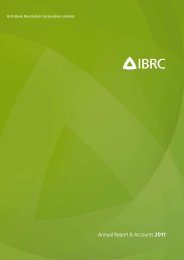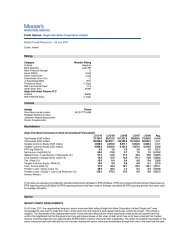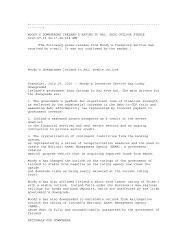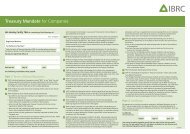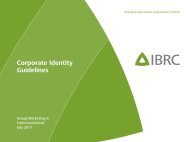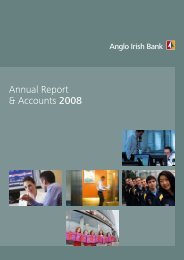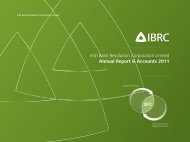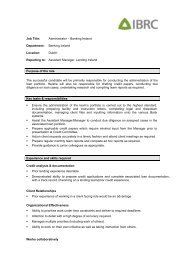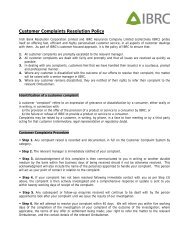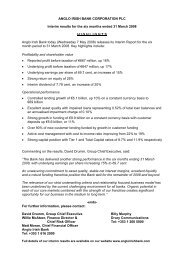Annual Report & Accounts 2009 - Anglo Irish Bank
Annual Report & Accounts 2009 - Anglo Irish Bank
Annual Report & Accounts 2009 - Anglo Irish Bank
You also want an ePaper? Increase the reach of your titles
YUMPU automatically turns print PDFs into web optimized ePapers that Google loves.
1.25 Leases<br />
Group as lessor<br />
Leasing and instalment credit agreements with customers are classified as finance leases if the agreements transfer substantially all the<br />
risks and rewards of ownership of an asset, with or without ultimate legal title. An asset classified as a finance lease is recorded within<br />
loans and advances to customers as a receivable based on the present value of the lease payments, discounted at the rate of interest<br />
implicit in the lease, less any provisions for bad and doubtful rentals. The difference between the total payments receivable under the<br />
lease and the present value of the receivable is recognised as unearned finance income, which is allocated to accounting periods under<br />
the pre-tax net investment method to reflect a constant periodic rate of return.<br />
Assets leased to customers are classified as operating leases if the lease agreements do not transfer substantially all the risks and rewards<br />
of ownership. Where leased assets are included within investment property held on own account in the Group's statement of financial<br />
position, depreciation is provided on the depreciable amount of these assets on a systematic basis over their estimated useful lives.<br />
Rental income from investment property held on own account and related lease incentives granted are recognised on a straight-line basis<br />
over the non-cancellable term of the lease. Investment contract accounting applies where leased assets are included within investment<br />
property held in respect of linked liabilities to customers.<br />
Group as lessee<br />
Operating lease rentals payable and related lease incentives receivable are recognised in profit or loss on a straight-line basis over the<br />
non-cancellable term of the lease.<br />
1.26 Interests in joint ventures and associates<br />
Joint ventures are contractual arrangements whereby two or more parties undertake an economic activity that is subject to joint control.<br />
An associate is an entity in which the Group has significant influence, but not control, holding between 20% and 50% of the voting<br />
rights. The determination of significant influence includes a consideration of the Group’s ability to participate in the financial and<br />
operating policies of the entity.<br />
The Group's interests in joint ventures and associates are recognised using the equity method of accounting and are initially recognised<br />
at cost, with the exception of interests in joint ventures or associates held under investment contracts which are designated at fair value<br />
through profit or loss. Under the equity method, the Group's share of the post-acquisition profits or losses after taxation of joint ventures<br />
and associates is recognised in profit or loss and its share of post-acquisition movements in reserves is recognised in reserves. The<br />
cumulative post-acquisition movements are adjusted against the carrying amount of the investment.<br />
Where the Group’s share of losses in an associate or joint venture equals or exceeds its interest in the associate or joint venture the<br />
Group does not recognise further losses unless it has incurred obligations or made payments on behalf of the associate or joint venture.<br />
Unrealised gains on transactions between the Group and its associates or joint ventures are eliminated to the extent of the Group’s<br />
interest in the associate or joint venture. Unrealised losses are also eliminated to the extent of the Group’s interest in the associate or<br />
joint venture unless they provide evidence of impairment of the Group’s interest in the associate or joint venture.<br />
The calculation of the share of the results of joint ventures and associates is adjusted where necessary to ensure consistency with the<br />
Group's accounting policies.<br />
1.27 Venture capital and other investments<br />
Equity shares and similar instruments held on own account as part of a venture capital portfolio are carried at fair value with gains and<br />
losses taken to net trading income as they arise.<br />
All other equity shares and similar instruments held on own account are classified as available-for-sale. They are held in the statement of<br />
financial position at fair value with unrealised gains or losses being recognised directly through reserves except for impairment losses,<br />
which are recognised immediately through profit or loss. Income on these equity instruments is credited to other operating income.<br />
1.28 Sale and repurchase agreements<br />
Debt securities sold subject to a commitment to repurchase them are retained in the statement of financial position when substantially all<br />
the risks and rewards of ownership remain with the Group. The liability to the counterparty is included separately in the statement of<br />
financial position in deposits from banks or customer accounts as appropriate.<br />
When securities are purchased subject to a commitment to resell, but the Group does not acquire the risks and rewards of ownership,<br />
the transaction is treated as a collateralised loan and recorded within loans and advances to banks or customers as appropriate. The<br />
securities are not included in the statement of financial position.<br />
The difference between the sale and repurchase price is treated as interest and is accrued over the life of the agreement using the<br />
effective interest rate method.<br />
Securities lent to counterparties are retained in the financial statements. Securities borrowed are not recognised in the financial<br />
statements.<br />
1.29 Share capital<br />
On 21 January <strong>2009</strong>, under the terms of the <strong>Anglo</strong> <strong>Irish</strong> <strong>Bank</strong> Corporation Act, <strong>2009</strong>, all of the <strong>Bank</strong>'s ordinary and preference share<br />
capital was transferred to the Minister for Finance.<br />
Share issue costs<br />
Incremental costs directly attributable to the issue of new shares are shown in equity, net of tax, as a deduction from the proceeds.<br />
<strong>Anglo</strong> <strong>Irish</strong> <strong>Bank</strong><br />
<strong>Annual</strong> <strong>Report</strong> & <strong>Accounts</strong> <strong>2009</strong><br />
55



